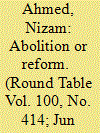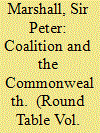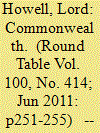| Srl | Item |
| 1 |
ID:
105401


|
|
|
|
|
| Publication |
2011.
|
| Summary/Abstract |
This paper explores the characteristics, performance and pitfalls of the non-party caretaker government (NPCG) system that Bangladesh has developed to ensure foolproof parliamentary elections and an orderly succession of government. This system differs from the traditional system of the succession of government in a number of ways: first, none of the caretakers (members of NPCG) can be a member of the outgoing government; second, no caretaker can contest the elections; and third, none can also be a member of any political party. The NPCG can undertake only election-related activities; it is not authorised to take any major policy decision. The article examines the context within which the successive caretaker governments (since 1991) have worked and compares and contrasts their performance. It shows that although initially appreciated for its unique contribution to the transition to democracy from authoritarianism, and particularly to the orderly succession of government, the NPCG system has recently been attacked and seemingly rejected by those who were instrumental in its creation-party politicians. This paper explores the logic and politics underlying the shift in party attitude towards the NPCG system, arguing that the latter probably outweighs the former. It suggests that the system needs reform, not abolition.
|
|
|
|
|
|
|
|
|
|
|
|
|
|
|
|
| 2 |
ID:
105399


|
|
|
|
|
| Publication |
2011.
|
| Summary/Abstract |
This is an extended version of Philip Murphy's inaugural lecture as director of the Institute of Commonwealth Studies, delivered on 23 February 2011. It traces the relationship of the UK with the wider Commonwealth over 40 years, paying particular attention to the rhetoric of governments and opposition parties from Wilson and Heath to Cameron. It examines the reasons for the Commonwealth being relegated to a peripheral role in British foreign policy, especially European preoccupations and the issues of Rhodesia and South Africa. It argues that the Commonwealth remains of considerable practical and enormous symbolic importance to the UK. The British government should engage with the Commonwealth more than it has done in the recent past and the Commonwealth should be both open to and critical of its imperial past.
|
|
|
|
|
|
|
|
|
|
|
|
|
|
|
|
| 3 |
ID:
105398


|
|
|
|
|
| Publication |
2011.
|
| Summary/Abstract |
The UK Coalition government, coming to power in May 2010, has already shown a more positive and purposeful approach to the Commonwealth than any of its predecessors. There is every reason for optimism that this will be maintained. This article gives an outline of the work and special character of the Commonwealth and looks forward to the report of the Eminent Persons' Group, the Perth Commonwealth Heads of Government Meeting and Her Majesty Queen Elizabeth's forthcoming Diamond Jubilee.
|
|
|
|
|
|
|
|
|
|
|
|
|
|
|
|
| 4 |
ID:
105397


|
|
|
|
|
| Publication |
2011.
|
| Summary/Abstract |
This article, based on a lecture delivered in London, sets out why the Commonwealth is important and why it is ideally placed as a network for the future, with a unique role in the 21st century. It argues that the Commonwealth is the 'world's best soft power network'. The author sets out how the Coalition government in Britain, headed by Prime Minister David Cameron, is actively upgrading its engagement with the Commonwealth and how it is committed to putting the 'C' back into the Foreign and Commonwealth Office. The article also outlines the UK's hopes for the work of the Eminent Persons' Group, the Commonwealth Ministerial Action Group and the Perth Commonwealth Heads of Government Meeting.
|
|
|
|
|
|
|
|
|
|
|
|
|
|
|
|
| 5 |
ID:
105400


|
|
|
|
|
| Publication |
2011.
|
| Summary/Abstract |
Notwithstanding the challenges of poverty and a political economy of underdevelopment, the post-colonial State in the Commonwealth Caribbean has been able to sustain a consistent record of commitment to democracy, 'free and fair' elections and open party electoral competition. However, the dominant view that the Caribbean represents an oasis of democratic stability in the developing world has suffered irreparable damage given widespread corruption, institutional inertia, open challenge to the State and clear structural deficiencies even while elections are conducted in an atmosphere of seeming freeness and fairness. It is clear therefore that democracy is under challenge in the region and that inadequate attention has been paid to bolstering its democratic content. However, recent decisions by the judicial system against sitting prime ministers and governments portend well for the overall health of democracy in the region in spite of its numerous challenges. Further, democratic consolidation is evident given the efforts that have been made to correct some of the democratic deficits.
|
|
|
|
|
|
|
|
|
|
|
|
|
|
|
|